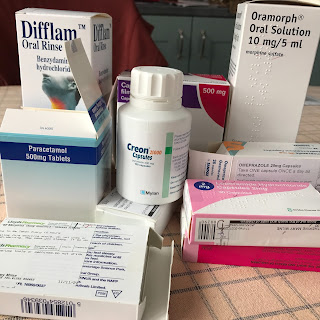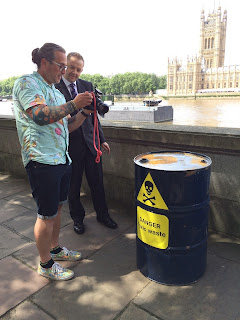A year on - how should we talk about cancer?
A year ago today my life was flung onto a completely unexpected arc.
We were shown into the consulting room, and I remember the doctor's eyes above his mask as he explained that I had a 3.7cm diameter lesion in my pancreas and another in my liver. It was probably not operable. I needed some more tests and then it was likely that I would be offered chemotherapy - but the aim would be to prolong my life rather than cure the cancer.
A year on. One of the toughest of my life, and the prognosis hasn't changed.
But the positives are many. The first is: I'm still here. I'm already on the right side of the survival statistics for pancreatic cancer.
In fact I am more than still here. Up until this week when I restarted chemo (see below), I have been working full time and I'm still able to do pretty much everything I want. I've seen my sons' fourteenth and seventeenth birthdays, and my 56th. Barring disasters (being run over by a bus?!) I will be around for Christmas. My last scan in September showed that the tumour was still smaller than it was at diagnosis, and while there are now three secondaries in my liver, it's not spread anywhere else.
I've seen more friends this year, despite Covid, than ever before. I've reconnected with people I hadn't seen for twenty or thirty years. I've been carried by wave upon wave of love, prayers and practical support. I've learnt to say yes to help. And somehow every time a vase of flowers starts to die and has to be thrown out, another bunch appears.
I have been learning to live with this cancer and trying to find what it has to teach me.
So I want to use this one year anniversary to write about how we talk about cancer, and to suggest that we might want to think again.
The words I hear most often are these: Battle. Fight. Win. Lose.
She's battling cancer.
The battle with cancer. The fight against cancer. We will win. We will beat cancer.
She lost her battle with cancer.
For far longer than the last year, I found this language unsettling. Is cancer really the ultimate enemy? Is it unique? And what does this language feel like for the families of those who are said to have 'lost their battle'?
Well now I do know. And now I have that right. So I'm going to tell you what I think.
Let me make myself quite clear. I am not battling with cancer. I am not in a fight. And when I die, I certainly won't have lost anything.
Yes I have cancer. I live with it, every day, and sooner or later it is going to cause me to die. But I'm not in a battle.
It's language we've got so used to using in relation to cancer that it has become everyday. But language is powerful, and the words we use influence the way we think about things.
As most of you know, I work in communications for a charity so I have spent quite a lot of time thinking about how to frame complex issues in simple compelling language. I can understand why some cancer charities have personified cancer as the 'enemy' in order to enlist us all in a fight against it.
Maybe as cancer treatments have improved and more and more people do survive what was previously always a terminal disease, maybe the language fits people's experience better. And of course as I've learned this year, sometimes it does feel like a battle - to keep going, to keep positive, not to give up.
But why should this disease, above all others, be framed in the language of conflict? And why should dying from a horrible disease be described as some kind of defeat? It carries with it all sorts of associations of failure, of not having tried hard enough, that I really find unhelpful.
I've been reading a book called 'The Cancer Whisperer: How to let cancer heal your life' by Sophie Sabbage. (Incidentally the first book about having cancer that I have found myself able to read.)
While I don't see eye to eye with Sophie Sabbage about everything (no colonic irrigation for me, thanks!), she writes beautifully on the subject of embracing cancer and learning from it.
'We have been trying to break cancer for decades, even centuries, to little avail compared to the progress medicine has made with other diseases. We are in a hostile and adversarial relationship with a condition there is still no reliable cure for. ... So perhaps it is time to communicate with this disease on a whole new level and take our relationship with it to a new horizon by working in sympathy with it to gain its cooperation. Perhaps it is time to take it off the battlefield and into the classroom. Perhaps it is time to ask not only how we can heal the cancer in our bodies, but also what our cancer is telling us about how to heal our lives.'
Sophie died recently, seven years after her diagnosis. I'm so grateful to my friend Sara for introducing me to Sophie's ideas. I'm not sure I am yet able to embrace my cancer as Sophie Sabbage has done. I hope that maybe one day I will be. But I have learned this year that if there is a battle, it is not a battle with my own body. And that I am learning to live as fully as I can despite the cancer - and maybe even because of the cancer.
***
To finish, an update. On Wednesday, I started a new course of chemotherapy. Two drugs this time - gemcitabine and capecitabine or GemCap for short. It was a bit weird to be back at the chemo unit, nice to see familiar faces, not so nice to be back in the routine of needles, drips, feeling mildly sick, packs and packs (and packs) of tablets... The new normal: weekly infusions of gemcitabine for three weeks, with capecitabine tablets to take every day, and then a week off to recover. Rinse and repeat. I'll tell you if there is anything more exciting soon.
This blog is dedicated to two friends: Sara S, for introducing me to the work of Sophie Sabbage, and for walking this path ahead of me. (Sometimes literally... I love our dog-walk talks!) and Leanne C, for all your support, practical and emotional, and for just being there. My D-day will always be your birthday Leanne and that gives me a great reason to celebrate :-)
P.S. And when I die, if any of you dare say that I lost my battle with cancer, I will come back and haunt you. So there.




Thanks for this Mary. I agree with your sentiment. 'Cancer' is used the categorise a horde of neoplastic conditions. Some are aggressive and need firm handling, and others proceed slowly and respond well to treatment.
ReplyDeleteSome things in life we have to come to terms with, but if it's going to around like an uninvited guest then we learn to live with it. Nowadays a lot of people with a diagnosis of cancer live a long life span and are in good spirits and health.
You seem to be very realistic and have a lot of insight and introspection. I hope to get to England next year again to catch up with family and friends. When I have dates I will email you and Chris.
Meanwhile, enjoy yourself.
Regards
Steve
Thanks, Mary - this is very helpful, as well as powerful.
ReplyDeleteA wonderful read Mary.
ReplyDeleteWishing you and your boys a happy Christmas
Love Paula x
Dear Mary, you write beautifully and I agree with everything that you say: it doesn't seem appropriate to comment about someone else's experience. I've always worried about "lost battles" as if someone has failed or should have tried harder. Think of you often, and other friends too.
ReplyDeleteThank you.
thanks for another wonderful blog post. You may want to take a look at Liz O'Riordan's blog posts here: https://liz.oriordan.co.uk/ she is a breast surgeon who developed breast cancer and then a second breast cancer, she is very passionate about the (inappropriate) use of combative language in cancer. she also has a podcast which I really like listening to, it really helps me in my clinical practice. sending lots of good wishes to you and your whole family, Jo
ReplyDelete